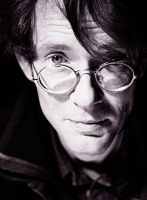
William Ford Gibson (March 17, 1948, Conway, South Carolina) is an American-born Canadian science fiction author. He has been called the father of the cyberpunk subgenre of science fiction. He is credited with coining the term "cyberspace". His first novel, Neuromancer, has sold more than 6.5 million copies worldwide since its publication in 1984.
In 1968, Gibson went to Canada "to avoid the Vietnam war draft" (see the 1999 Mark Neale documentary, "No Maps for These Territories") in the US. In 1972, he settled in Vancouver, B.C. and began to write science fiction. He has spent most of his adult life in Canada, and still lives in the Vancouver area.
His early writings are generally futuristic stories about the influences of cybernetics and cyberspace (computer-simulated reality) technology on the human race. His themes of hi-tech shantytowns, recorded or broadcast stimulus (later to be developed into the "sim-stim" package featured so heavily in Neuromancer), and dystopic intermingling of technology and humanity, are already evident in his first published short story, "Fragments of a Hologram Rose" (1977). The latter thematic obsession was described by Gibson's friend and fellow author, Bruce Sterling, in Sterling's introduction to the Gibson short story collection, Burning Chrome, as "a one-two combination of high-tech and low-life". In the 1980s, his fiction developed a film noir, bleak feel; short stories appearing in Omni began to develop the themes he eventually expanded into his first novel, Neuromancer. Neuromancer was the first novel to win all three major science fiction awards: the Nebula, the Hugo, and Philip K. Dick Memorial Award.
The novels rounding out his first trilogy - commonly known as the "Sprawl trilogy" - are Count Zero and Mona Lisa Overdrive.
Gibson's second trilogy, the "Bridge trilogy", centers on San Francisco in the near future and evinces Gibson's recurring themes of technological, physical, and spiritual transcendence in an arguably more grounded, matter-of-fact style than his first trilogy. The books in this trilogy are titled Virtual Light, Idoru, and All Tomorrow's Parties.
After "All Tomorrow's Parties", Gibson has begun to adopt a more realist style of writing, with continuous narratives. His novel Pattern Recognition, set in the present day, entered mainstream bestseller lists for the first time.
In 1992, Gibson wrote Agrippa (A Book of the Dead), an electronic poem. It was about the ethereal nature of memories (the title refers to a photo album), for an artist's book collaboration with painter Dennis Ashbaugh and publisher Kevin Begos. The book included a self-erasing floppy disk intended to display the text only once, then "eat itself" after being read (Gibson quote from his weblog). The poem has since found its way onto the Internet. He commenced writing a weblog in early 2003, which remains active, with one major hiatus, into 2006. Gibson also wrote a treatment of Alien³, few elements of which found their way into the film.
Two of his short stories have been turned into movies: 1995's Johnny Mnemonic, starring Keanu Reeves, and 1998's New Rose Hotel, starring Christopher Walken, Willem Dafoe, and Asia Argento. Gibson, together with his friend Tom Maddox, wrote the X-Files episodes "Kill Switch" and "First Person Shooter" and made a cameo appearance in the former. Gibson also made a cameo appearance in the miniseries Wild Palms. Gibson's article on fellow cyberpunk and occasional collaborator John Shirley can be read here.
Gibson was the focus of a 1999 documentary by Mark Neale called No Maps for These Territories, featuring Bono and The Edge reading excerpts from Neuromancer.
Despite all this, Gibson never had a special relationship with computers.
Homepage http://www.williamgibsonbooks.com/